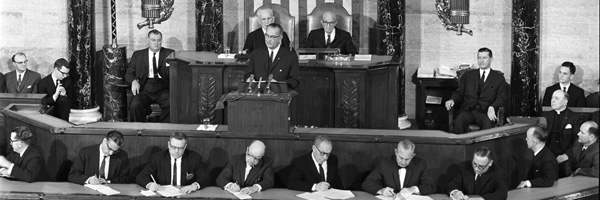
Critical Issues in America Series Continues With Winter Quarter Symposium
Fifty years after Lyndon B. Johnson gave his historic State of the Union address declaring an “unconditional war on poverty,” all eyes will be on President Barack Obama as he takes up economic inequality — which he identifies as “the defining issue of our time” — in the sixth State of the Union Address of his presidency.
On Friday, Jan. 31, three days after Obama’s address, UC Santa Barbara will recognize the significance of these two moments in the history of American democracy with a symposium titled “Organizing for Economic Democracy.” The symposium marks the continuation of “The Great Society at Fifty: Democracy in America 1964/2014,” UCSB’s Critical Issues in America series, and will consider the real legacy of the War on Poverty in the allied activities of the community action, economic development, legal and human services organizations that are on the front lines of the continuing fight against inequality.
The symposium will begin at 1 p.m. in the multipurpose room of the Student Resource Building at UCSB. It is free and open to the public.
“Johnson used his State of the Union Address to ask Congress to join him in fighting the war on poverty through full employment growth, an all-out ‘assault’ on discrimination and investments in education, job training and health care,” said Alice O’Connor, professor of history at UCSB and the series organizer.
At the heart of the administration’s program, according to O’Connor, was a bold plan for federal support of a locally organized network of community action and social welfare providers developed with “maximum feasible participation” from the poor. “By offering people a voice in creating local Head Start programs, community health centers, child nutrition, legal services and much more, the Community Action Program changed the dynamic of local struggles for access to human services and job opportunities that had been going on for decades, and worked in concert with the Civil Rights Act of 1964 to support movements for fair labor standards and workplace democracy,” she said.
The symposium consists of panel discussions on community action, workplace justice and poverty law and legal services. Among the speakers are Annelise Orleck, professor of history at Dartmouth College; Pete White, founder and co-director of the Los Angeles Community
Action Network; Sophia Lee, professor of law and history at the University of Pennsylvania Law School; Steven Pitts, associate chair of the UC Berkeley Labor Center; Clare Pastore, professor of law at the University of Southern California; and José Padilla, executive director of the California Rural Legal Assistance, Inc.
Other winter quarter events include a talk by Eileen Boris, Hull Chair in the Department of Feminist Studies at UCSB, titled “Who Cares About Those Who Care? An Argument and Interaction.” Her talk begins at 4 p.m. on Thursday, Jan. 30, in the McCune Conference Room, 6020 Humanities and Social Sciences Building. It is also part of the UCSB Interdisciplinary Humanities Center’s “Value of Care” series.
Also, on Friday, Feb. 7, the daylong conference “Re-reading the Feminist Sixties” will bring feminist scholars together at UCSB to explore work, social movements and politics in a multicultural context.
The Critical Issues in America series will continue spring quarter with featured talks by Sasha Abramsky, author of the best-selling “The American Way of Poverty: How the Other Half Still Lives”; Dean Baker, co-founder of the Center for Economic and Policy Research in Washington, D.C., and author of several books, including “Getting Back to Full Employment” and “The End of Loser Liberalism: Making Markets Progressive”; and Paul Starr, co-founder of The American Prospect, professor of sociology and public affairs at Princeton University and author of “Remedy and Reaction: The Peculiar American Struggle Over Health-Care Reform” and the Pulitzer Prize-winning “The Social Transformation of American Medicine.”
Starr’s talk will be followed by a symposium titled “Health Care Rights and Health Care Reform from Medicare to Obamacare,” featuring reports from the front lines of state and local efforts — both official and grassroots — to implement the Affordable Care Act.
Also on the schedule for spring quarter are featured speakers William P. Jones, author of “The March on Washington: Jobs, Freedom, and the Forgotten History of the Civil Rights”; and Karen Ferguson, author of “Top Down: The Ford Foundation, Black Power, and the Reinvention of Racial Liberalism”; and “The American Labor Movement: Crisis and Creativity,” a two-day conference co-sponsored with UCSB’s Center for the Study of Work, Labor, and Democracy and the National Union of Healthcare Workers.
More information about “The Great Society at Fifty: Democracy in America 1964-2014,” including a complete schedule of events, can be found at http://www.history.ucsb.edu/greatsociety.
An endowed program in the College of Letters & Science at UCSB since 1995, and co-sponsored by other campus departments, the Critical Issues in America series examines relevant social topics from a multidisciplinary perspective. Previous series have focused on environmental issues and policy reform; media ownership; women, employment and globalization; violence in America; ethnic studies; marriage and alternatives.



